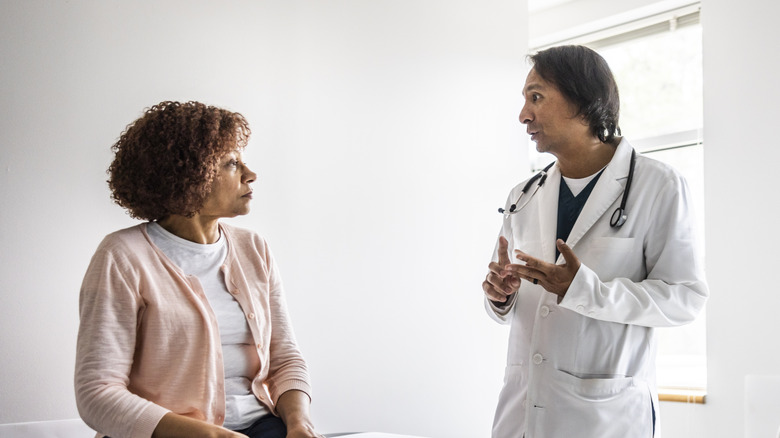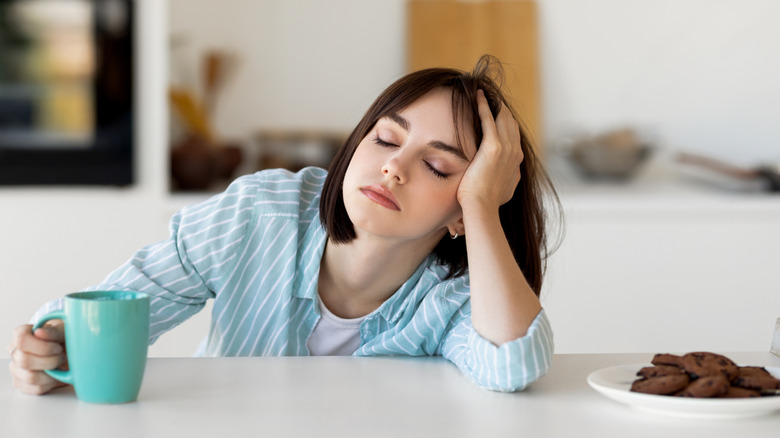
Amnaj Khetsamtip/Shutterstock
Everyone can relate to that late-afternoon slump. You’re working at your desk and notice some brain fog or perhaps dozing off. You may even notice the same thing after you eat a Thanksgiving meal or a huge buffet. A few hours later, you’re desperate for a nap or a double espresso.
Depending on what, when, and how much you eat, your blood sugar can spike and then crash, which can leave you feeling really sleepy. This is especially likely after meals that are heavy in refined carbs, like starchy foods and sugary treats, because your body digests them quickly. To bring your blood sugar back down, your body releases insulin, which helps move the sugar into your cells to be used for energy or stored for later. But if your body doesn’t make enough insulin or doesn’t use it the right way, these big swings in blood sugar can happen more often. This could be a sign of diabetes.
Signs your post-meal sleepiness might be diabetes

Momo Productions/Getty Images
According to the Centers for Disease Control and Prevention, about 10% of Americans have diabetes, and most of those people have type 2 diabetes. Type 2 diabetes is a serious condition that can develop as you get older, but younger people are increasingly being diagnosed as well. Post-meal fatigue is just one symptom of diabetes. You may want to test for diabetes if you also notice frequent pee breaks, increased thirst, blurry vision, slow-healing wounds, or tingling hands or feet. Even if you’re tired after eating, you also may feel hungry. Some people may have unexplained weight loss. (Here are the different types of diabetes, explained.)
Symptoms of type 2 diabetes can take years to show up, which is why it’s important to keep an eye on your blood sugar if you’re at risk. Risk factors include being overweight, exercising less than three times a week, or being over the age of 45. Your risk is also higher if you have a family history of type 2 diabetes or if you were diagnosed with gestational diabetes during pregnancy. Certain ethnic groups, including African American, Hispanic/Latino, and Native American communities, also have a higher risk of developing type 2 diabetes.
Other reasons why you’re sleepy after eating

Prostock-studio/Getty Images
Feeling sleepy after a meal doesn’t necessarily mean you have type 2 diabetes. So let’s go back to that Thanksgiving dinner. Many people blame the tryptophan in turkey for that food coma, but have you ever noticed you feel that way when you eat at a buffet? Simply eating too much can cause you to feel tired and sluggish, especially if that food is high in fat. It takes energy to digest all that food. Your body sends blood to your digestive system, which could leave you feeling drowsy.
If you’re not drinking enough fluids, you may feel tired after a meal. Dehydration overall will cause you to feel more fatigued. Make sure those fluids don’t have caffeine or alcohol, which can leave you more dehydrated. And yes, that little bit of alcohol with dinner can add to your feeling more tired after eating.
You also may feel tired after eating if you’re relatively inactive. Rather than falling asleep at your desk or collapsing on the couch after a meal, try going out for a short walk (or a “fart walk”) before the fatigue sets in. A short walk will help stabilize your blood sugar so you won’t feel that dip in energy. A 2022 meta-analysis in Sports Medicine found that light walking can significantly reduce your blood sugar and insulin levels, and a light walk after a meal can moderate the spikes and drops in blood sugar.
Credit: healthdigest.com









